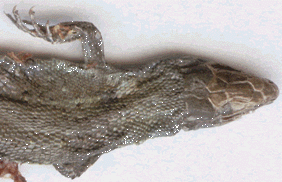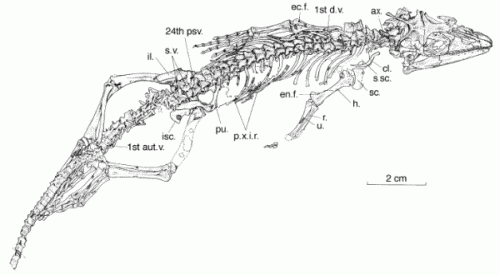
| Palaeos |  |
Squamata |
| The Vertebrates | Squamata |
| Page Back | Unit Home | Unit Dendrogram | Unit References | Taxon Index | Page Next |
| Unit Back | Vertebrates Home | Vertebrate Dendrograms | Vertebrate References | Glossary | Unit Next |
|
Abbreviated Dendrogram
LEPIDOSAUROMORPHA |--SPHENODONTIA `--SQUAMATA |--Iguania | |--Tropiduridae | |--Acrodonta | | |--Priscagamidae | | `--+--Agamidae | | | |--Amphibolurinae | | | `--Draconinae | | `--Chamaeleonidae | `--Iguanidae `--Scleroglossa |
Contents
Overview |
 Squamata:
lizards, mosasaurs and snakes.
Squamata:
lizards, mosasaurs and snakes.
Range: from the Early Jurassic.
Phylogeny: Lepidosauria : Rhynchocephalia + * : Huehuecuetzpalli + (Scincogekkonomorpha + Iguanomorpha).
Characters: premaxillae fused [C&L]; sutured mandibular symphysis [LBC]; anterior & posterior lower jaw elements immobilized relative to each other [LBC]; $ angular short, not reaching level of mandibular condyle [C&L]; $ coronoid process large, formed only by coronoid bone (not surangular) [C&L]; $ surangular bears transverse shelf [d&R]; maxilla, palatine & pterygoid sutured to other elements and are akinetic [LBC]; $ palatines with choanal groove [C&L]; $ transverse flanges of pterygoid point anterolaterally & are at or above level of marginal teeth [d&R]; $ pterygoids do not meet at midline [C&L]; $ pterygoids broadly enter suborbital fenestrae [C&L]; nasals reduced; $ anteroventral border of orbit formed by jugal rather than maxilla (frequent reversals) [C&L]; $ posterior process of jugal absent [C&L]; $ frontal-parietal suture simple & transverse [d&R][C&L]; flexible frontal-parietal articulation (mesokinetic joint) allows some raising of snout [LBC]; frontals and/or parietals [$ per C&L] may be fused at midline; $ parietal table short, with posterior exposure of braincase [C&L]; metakinetic hinge between parietals and occiput [LBC]; $ loss of lower temporal bar [d&R]; $ loss of quadratojugal [d&R][C&L]; $ flexible hinge at articulation of quadrate and squamosal (streptostyly: rotation of quadrate around squamosal allows pterogoideus muscle to exert maximum force near closure) [d&R] [LBC]; quadrate embayed to support stapes for hearing; squamosal reduced; $ squamosal rod-like, without ventral process [C&L], & squamosal does not wrap around posterior of skull [d&R]; $ stapes slender [C&L]; $ proatlas absent [C&L]; vertebral centra amphicoelous in basal forms, derived forms are often procoelous ($ of [C&L]); $ >7 cervical vertebrae [C&L]; $ intercentra absent [C&L]; $ gastralia absent [C&L]; primitively, scapulocoracoid sometimes fenestrated, $ thyroid fenestration of pelvis [C&L]; ends of humerus not twisted >20 deg. relative to each other; primitively, proximal tarsals not fused; strong tendency to reduction or loss of limbs; determinate growth (related to insectivory?).
Note: Remarkably little overlap between synapomorphies of C&L and d&R. Note how many of the C&L synapomorphies are either absences of a feature or quantitative differences (e.g. parietal short). These are not necessarily a bad thing, but do raise questions about homology. Recall that the issue is whether these are derived features inherited from a common ancestor. This is less likely to be true of absences and quantitative differences.
Image: Lacerta vivipara © Bioimages (UK), used by permission.
Links: Rattlesnake... from Skulls Unlimited; The Boa Constrictor Subspecies; Literature - Squamata; SQUAMATA; EMBL; Wild Herps; Order Squamata; Discover Canada's Aquatic Reptiles - Snakes and Lizards: Order Squamata; Squamata Verlag (English & German); Palaeoscincosaurus middletoni; Encyclopedia.com - Results for snake; temp; Squamata (ToL); Squamata (Mikko's Phylogeny); SQUAMATA; Squamata (Snakes & Lizards).
References: Caldwell & Lee (1997) [C&L]; deBraga & Rieppel (1997) [d&R]; Lee et al. (1999) [LBC]. ATW040220.
 |
| Skeleton of holotype of Huehuecuetzpalli mixtecus. Image © 1998 The Royal Society. Most of the long tail is missing from this specimen |
Range: Middle Cretaceous (Albian) of Mexico
Phylogeny: Squamata :(Scincogekkonomorpha + Iguanomorpha) + *
Characters: elongation of the snout and the apparent retraction of the external nares
Comments: Includes some Iguanian characters, but also a large number of basal qualities which imply it belongs outside the crown squamatan group (Reynoso 1998, Evans 2003). Considered basal-stem Iguanian in the cladogram in Evans & Wang 2010. In view of Iguanians being strongly characterised by primitive features, and the tentative nature of the phylogeny in Evans & Wang 2010, I've followed Reynoso 1998 and Wiens et al 2010 in interpreting Huehuecuetzpalli as a stem squamate. The existrence of such a basal taxa so late in the Mesozoic made this long-snouted and long-tailed lizard a "living fossil" of its time. MAK101106
| Page Back | Unit Home | Page Top | Page Next |
checked ATW050806